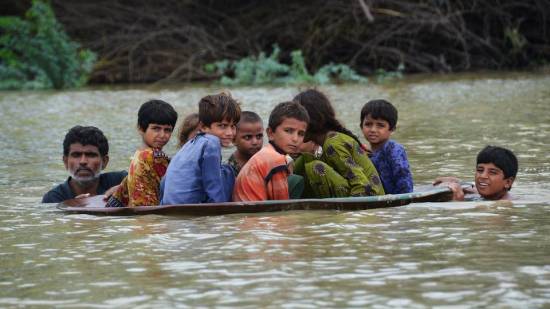Flood victims share tales of horror as rains wreak havoc across Pakistan
It took only four hours to completely inundate the small village of farmer Altaf Hussain near historical Ranipur town of Pakistan's southern Sindh province, where swirling floodwaters washed away dozens of houses, animals, and crops last week.
Like hundreds of thousands of other displaced Pakistanis, Hussain from village Dur Mohammad Langrija Goth is currently lodged at a government school-turned-shelter camp in the port city of Karachi, but the ordeal he faced is settled in his mind.
Massive floods described by Prime Minister Shehbaz Sharif as "unprecedented in the last 30 years" have killed at least 1,061 people and affected more than 33 million across the country.
"It was midnight when the floodwaters struck our village. I was already awake, expecting something untoward as it had continuously been raining for the last 30 hours,” Hussain, a father of four, told Anadolu Agency.
The nearby Thari Mirwah canal and various streams burst their banks due to incessant rains, inundating the entire Ranipur town, located some 420 kilometres from Karachi, forcing the panicked residents to leave their homes for safety.
"It took me a few seconds to realize what was going on due to the loud screams and shouting (from adjacent houses). I woke up (my) kids and others and made them rush to the roof," Hussain recalled.
"It was a horrific scene that we could hardly see through the torches and mobile phone light from the rooftop as a deluge was heading towards our village," he went on to say.
Initially, Hussain said, he thought he and the family could survive on the rooftop but within hours he had to review his plans as floodwaters submerged streets, fields, and houses to alarming levels.
A timely operation by the army troops rescued the marooned villagers, including 20 members of Hussain's family.
Hours later, the raging floodwaters either washed away or badly damaged all the 500 houses of his ill-fated village.
“Nothing is left. All the houses and crops are destroyed,” Hussain added, trying to fight back his tears.
Hussain's family spent two shelter-less nights with no food along the main road where an army boat dropped them. A cargo truck eventually shifted them to this shelter camp.
'Only an hour to leave'
Mohammad Hussain Manganhar, a resident of Mehrabpur town, located roughly 380 kilometres from Karachi, had a similar account to share.
“The administration gave us only an hour to leave the village as floodwaters had already hit the adjacent towns and villages,” said Manganhar, whose family boarded a tractor-trolley along with whatever luggage they could carry in a hurry.
Speaking to Anadolu Agency at a shelter camp at Sachal Goth, a suburban locality in Karachi's eastern district, he said the flooding caused by massive rains and the bursting of the banks of a stream washed away hundreds of houses and animals in their village.
“There was a hue and cry. Everyone was trying to board the tractor trollies, donkey, and bull carts, while many started to walk towards the main road,” he recalled.
Fears of further inundation, including the road where the panicked family took refuge, prompted Manganhar to move to the shelter camp in Karachi.
"The entire Sindh is under water. Karachi is the only safe area," he said.
"Here, at least we get meals twice a day," he added.
Uncertain future
Unprecedented floods caused by record-breaking rains have inundated half of the country and killed over 1,000 people since mid-June.
Constant rains and raging floods have already destroyed a large chunk of infrastructure and agricultural lands across the country, including tens of thousands of houses, roads, and bridges, and washed away nearly a million animals.
The large-scale destruction has rendered the future of hundreds of thousands of people like Hussain and Manganhar bleak.
Experts fear a widespread migration within Pakistan due to the destruction of agricultural lands and businesses by the latest floods.
More than two million people had been displaced by massive floods that inundated one-fifth of the country in 2010, triggering mass migration to cities from rural Pakistan.
Of that figure, almost 70 percent did not go back to their hometowns and permanently settled in big cities to make a living because of the destruction of their homes and farmlands.
Source: AA


